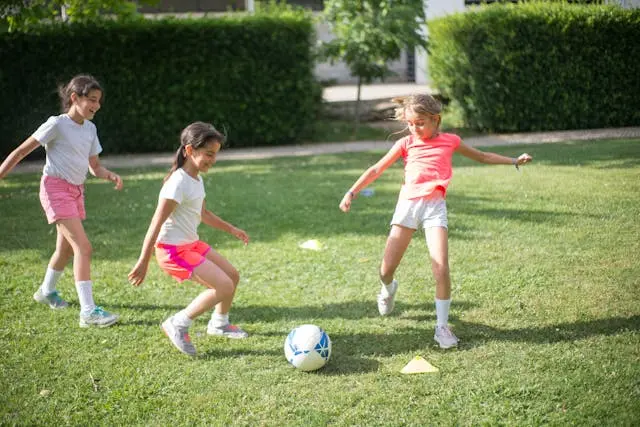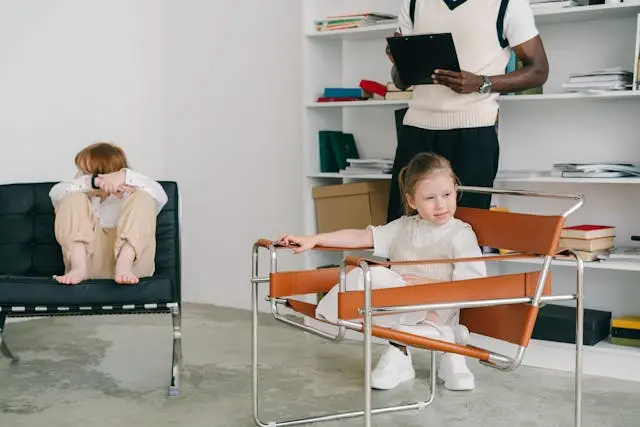Maintaining Strong Family Bonds Through Divorce Co-Parenting
The article is developed in partnership with BetterHelp.
If you have a child and you’ve been considering divorce or are actively going through the divorce process, you’ve probably already considered the ramifications your divorce might have on your child(ren). You may be worried about the stress of being a “suitcase child,” or that your child will no longer have a strong sense of family.
While you navigate this process, it can be helpful to learn more about healthy co-parenting strategies and how to show your child that they’re still your number one priority.
How Divorce Affects Children

Parenting differences are one of the leading causes of divorce, but unfortunately, the challenges don’t usually stop once divorce paperwork has been signed.
Divorce, even when amicable, is shown to have a significant impact on the mental health of children, especially in the short term. Many studies find that, regardless of things like academic achievement, self-esteem, and conduct, children of divorced families experience, on average, lower levels of well-being.
Because of the emotional difficulty a child can experience in the face of divorce, strong family bonds are important for fostering emotional support, a sense of stability, security, self-esteem, and child development.
Navigating the Challenges of Divorce Co-parenting
Successful co-parenting requires mutual respect, appreciation, and compromise. This rule applies to parents who are together, divorced, or separated. In instances of serious issues, such as domestic violence or malicious parent syndrome, co-parenting may not be possible.
When possible, however, the following tips can help make divorce co-parenting more successful:
Therapy
Divorced parents often find themselves balancing parenting responsibilities with their former spouse. In many cases, it can be helpful for both parents to attend therapy separately, together, or they may even want to try family therapy with their child(ren).
Therapy for single fathers can help with things like balancing work and family responsibilities, learning how to be a better role model, building a healthier co-parenting relationship with ex-parents, or getting emotional support for the financial and legal stressors of divorce and child custody.
Instead of turning to your child for emotional support, a therapist or a friend can also be a great person to vent your frustrations about your co-parent.
Living with both parents
A survey of 2,301 children of divorced families living in the U.S. found that children experience fewer depressive symptoms and less social withdrawal when they live with both parents. When possible, researchers have found that the children of divorced parents benefit from shared physical custody that allows them to spend time significant time living with both parents.
Overall, studies find that children of divorced parents experience more mental health challenges than those with parents living together. However, children of divorced parents with joint physical custody experience better mental health outcomes than children who primarily, or only, live with one parent.
Consider whether nesting is a viable option, at least for a little while
In some circumstances, co-parents with amicable relationships may experience success “birdnesting.” With birdnesting, the child(ren) stay in the family home, with the parents cycling between living in the house. This approach may give children a greater sense of stability and normalcy, and it may be particularly helpful while your child(ren) adjust in the early stages of divorce.
Furthermore, if both parents have the option of living with family members or friends when not occupying the family home, nesting can be a logistically and financially easier option.
Set time to check-in with your co-parent
When both parents are involved in raising a child, it’s important to be on the same page about things like planned trips, introducing children to new partners, and issues they’ve noticed with the children. Some parents find that they can manage a regular check-in time to discuss changes and concerns, whereas other parents may find that they prefer to text, email, or share an electronic calendar. If you decide to meet in person, it’s often recommended that you find a neutral location to meet, such as a coffee shop.
Learn communication skills
Even after the divorce, co-parents often benefit from having some contact with one another to discuss parenting decisions. However, this could pose challenges, especially if the couple developed unhealthy communication styles while they were together. The following suggestions can help:
- Keep it to the point: Many people find it helpful to think of their co-parent as a colleague. Keep information polite, professional, to the point, and focused on the goal (your child’s well-being).
- Set boundaries: Establishing healthy boundaries can be helpful, and you should never engage in unproductive communication, blaming, insulting, or micromanaging the way that they parent.
- Let things simmer down: When conversations turn to blaming, name-calling, or otherwise become unproductive, it may be time to say you need to take a step back and reconvene when the discussion will be less heated.
- Decide on the best communication strategy: If conversations tend to escalate to arguments, you may want to reevaluate how you communicate. For example, consider whether in-person meetings, phone calls, texts, or emails may be the best approach.
- Make it a request: Statements often come across as demands. To make things easier, consider phrasing statements as a request. For example, you might say, “Would you be willing to feed the kids lunch before bringing them over?”, or “Can we try creating a shared calendar for afterschool activities and holidays to get ourselves more organized?”
- Remember who it’s all about: Your conversations with your co-parent should focus on your child. Keep the conversation focused on their needs and steer it back on track if it veers from that topic.
Remind yourself that your child benefits from the love and support of you both, and the less hostility between you and your ex, the better it is for your child.
Making the Most of Your Time with Your Child in Divorce Co-Parenting

Aside from navigating the logistics of co-parenting, there are also steps you can take to ensure you make the most of the time you get to spend with your child(ren), including:
1) Save children from the stress of divorce details
While children should be told necessary details, it’s not a good idea to overshare details about the divorce, legal proceedings, or criticism about your co-parent. Instead, you might tell your child how much you and your co-parent both love them.
2) Stay connected with your child
Even if you don’t have full physical custody of your child, you can keep in touch. For example, you might schedule a five-minute video call with them every day after school to check-in. When possible, you should also try to attend things like sports practices, games, parent-teacher conferences, recitals, birthday parties, or other events that are important to your child.
If you don’t spend significant time with your child each week, take note of what television shows, movies, authors, games, and other things they like. These preferences tend to change frequently in childhood, and surprising your child with a thoughtful gift that shows you’ve paid attention to their interests can demonstrate how much you care about them.
3) Pay attention to them
When you’re with your child, make every effort to put away distractions like your cell phone or the news. Children who’ve experienced divorce may be prone to internalizing things and think that being distracted equates to them being a “bad” or “unimportant” child.
4) Enjoy activities together
When you and your child try something new together, you can strengthen your bond and form positive memories together. Some fun activities to consider trying include:
- Hosting a family game night
- Having their friends come over for a pizza-making party
- Setting up an outdoor scavenger hunt
- Doing something active outdoors, like hiking, biking, rollerblading, or ice skating
- Visit local museums, attractions, farmers markets, or other events
- Sign up for a family-friendly dance class
- Attend a sporting event together
- Sign up for volunteer events at an animal sanctuary
Depending on the relationship you have with your co-parent, these activities may even be appropriate for you to attend with them and even each other’s partners. Having extra parental figures who get along and care about them could help your child feel extra loved and supported.
Final Thoughts on Effective Divorce Co-Parenting
Divorce entails some major life changes: Someone who was once your romantic partner suddenly becomes your co-parent, and time with your children, who you may have previously seen every single day, becomes split. You may also be tied up in legal proceedings that cause financial and emotional stress.
However, divorced co-parents can do many things to ensure their children feel loved and supported. Developing an organized communication strategy, ensuring time spent with the kids is quality time, speaking with a therapist, and ensuring that your child’s well-being stays the priority can go a long way towards strengthening family bonds.







